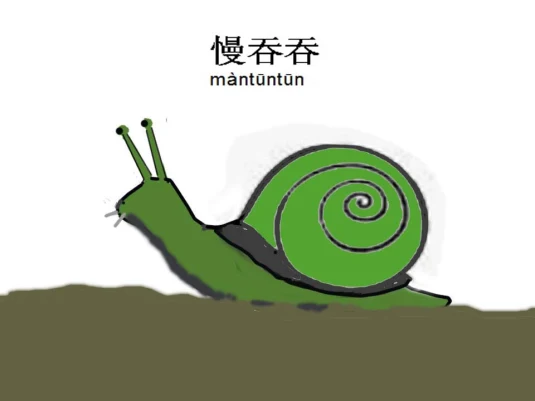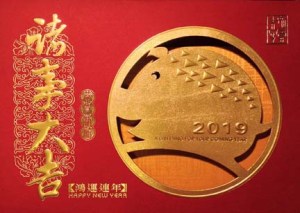
It’s St. Patrick’s Day, time to get my snowpea seeds planted in the garden. With luck there will be sweet pea shoots (豆苗 dòu miáo ) and crunchy pea pods (豆荚 dòujiá) to enjoy during summer. When it comes to waiting to harvest the fruit of your labor, time crawls … like a snail. To celebrate the occasion, there you have it, a green snail (蜗牛 wōniú).
Snails move slowly, very slowly. Simply using the word 慢 (màn) doesn’t do justice to its suggishness. Perhaps one might imagine it crawling forward at one mile per hour, stopping every minute to swallow some saliva before moving on. That is the picture painted by the adverb 慢吞吞地 (màn tūn tūn de very slowly).
Now compare the following two sentences:
她慢慢地吃饭.
Tā màn man de chīfàn.
She eats the meal slowly.
她慢吞吞地吃饭.
Tā màn tūn tūn de chīfàn.
She eats the meal very slowly.
The exaggeration in the second sentence adds interest to the description as well as authenticity to your spoken Chinese.
Repeating certain words in Chinese can produce a number of diverse effects. It could help smooth out a sentence, pinpoint emphasis, indicate plurarity, or achieve exaggeration (as we’ve seen above).
When referring to your older brother, you would normally say 我的哥哥 (wǒ de gēgē) instead of just 我的哥 (wǒ de gē). Similarly, when referring to your older brother’s wife, you woud say 我的嫂嫂 (wǒ de sǎosǎo) or 我的嫂子 (wǒ de sǎo zi). It sounds less abrupt than just uttering 嫂 once. See Chapter 3 of “Learn Chinese through Songs and Rhymes” for how to address the various members in the family as well as the extended family.
Many adjectives and adverbs are also repeated to improve the fluidity of the speech. Some examples:
弯弯的眉毛 (wān wān de méimáo) curved eyebrows
这件事怪怪的. (Zhè jiàn shì guài guài de.) This thing is weird.
慢慢地工作 (màn man dì gōngzuò) working slowly
轻轻地哼着歌 (qīng qīng de hēngzhe gē) humming a song softly or gently
呆呆地坐着 (dāi dāi de zuòzhe) sitting blankly
Everyone knows 人 (rén) means a person. When you double this word, the meaning changes to people. Similarly, when you say 天 (tiān day) twice in a row, it means every day or daily. Here are some additional examples: 日日 (rì rì day by day), 夜夜 (yè yè every night), 年年 (nián nián every year), (个个 gè gè all), 某某 (mǒu mǒu so and so – person), 处处 (chùchù everywhere).
Like 慢吞吞 (màn tūn tūn), there are many expressions containing repeated sounds to further characterize a description. Here are a few examples:
凶巴巴 (xiōng bābā) fierce
软趴趴 (ruǎn pā pā) soft and limp
软绵绵 (ruǎnmiánmián) soft as cotton
硬棒棒 (yìng bang bàng) hard as a rod
笑眯眯 (xiàomīmī) smiling genuinely, squinting the eyes
笑哈哈 (xiào hāhā) laughing heartily
热乎乎 (rèhū hū) hot or very warm
胖嘟嘟 (pàng dū dū) chubby
雨蒙蒙 (yǔ méng méng) rainy and drizzly
湿答答 (shī dā dá) dripping wet – Do you hear the sound of the water dripping?
湿淋淋 (Shī línlín) showery wet
光秃秃 (guāngtūtū) bare or bald
乱糟糟 (luànzāozāo) very messy
脏兮兮 (zāng xī xī) icky dirty
假惺惺 (jiǎxīngxīng) hypocritical
黑黝黝 (hēiyǒuyǒu) black, dark, dusky
雄赳赳气昂昂 (xióngjiūjiū qì áng’áng) courageous and spirited
那是猫哭老鼠, 假惺惺.
Nà shì māo kū lǎoshǔ, jiǎxīngxīng.
That’s a cat crying over a mouse, hypocrisy.
我们的战士雄赳赳气昂昂.
Wǒmen de zhànshì xióngjiūjiū qì áng’áng.
Our soldiers are brave and spirited.
For those of you who love four-character Chinese expressions, here is a bunch of easy ones:
日日夜夜 (rì rì (yè yè) day and night, all the time
男男女女 (nánnánnǚnǚ) men and women, or male and female persons
婆婆妈妈 (pópomāmā) garrulous or fussy like old women
马马虎虎 (mǎmǎhǔhǔ) so-so, passable, sloppy
风风雨雨 (fēng fēngyǔ yù) the trials of life
嘻嘻哈哈 (xīxīhāhā) laughing cheerfully
哭哭啼啼 (kūkūtítí) crying ones eyes out
来来回回 (lái láihuí hui) back and forth, to and fro
来来往往 (lái lái wǎngwǎng) passing by in great numbers
扭扭捏捏 (niǔ niǔniē niē) shy, not self-assured or straightforward
战战兢兢 (zhànzhànjīngjīng) trembling with fear, exercising caution
是是非非 (shì shìfēi fēi) scandals or gossips
拖拖拉拉 (tuō tuōlā lā) procrastinating, dilatory, dragging one’s feet
你准备好了吗?不要总是拖拖拉拉.
Nǐ zhǔnbèi hǎole ma? Bùyào zǒng shì tuō tuōlā lā.
Are you ready? Don’t keep dragging your feet.
圣帕特里克节快乐!
Shèng pàtèlǐkè jié kuàilè!
Happy St. Paatrick’s Day!

Recent Comments